Events September 2018
NEWSLETTER
MCAA AT EUROSCIENCE OPEN FORUM (ESOF 2018)
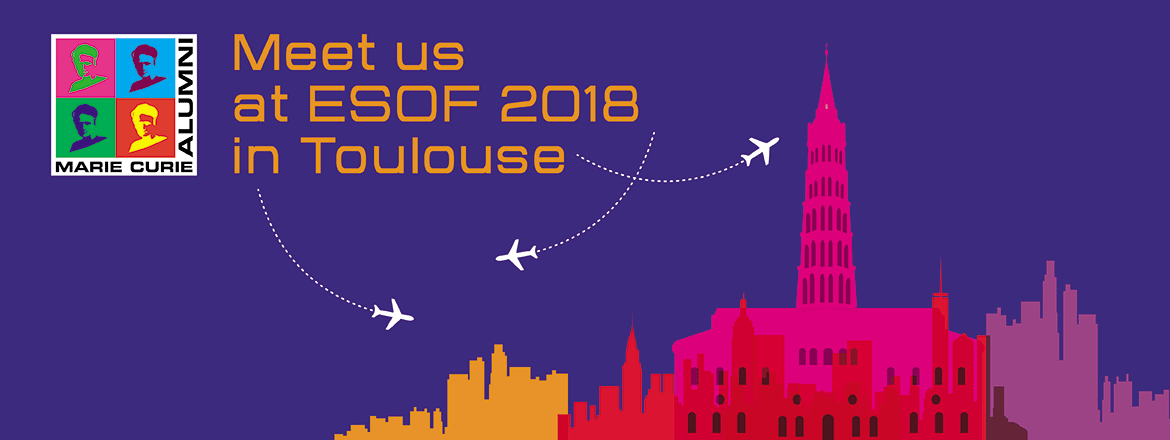
Researchers, science editors and communicators, as well as policymakers and representatives of industry and other related interest groups, gathered in Toulouse, France, in July for this year’s EuroScience Open Forum (ESOF). Described as the largest interdisciplinary meeting in Europe, the eighth edition of ESOF engaged stakeholders and the public in discussions about the latest scientific research findings and innovation. The Marie Curie Alumni Association (MCAA) coorganised several sessions on a range of topics, including science communication, family-friendly research and mental health in research.
SATELLITE EVENTS
Several satellite events were held in Toulouse ahead of the ESOF 2018 official kick-off. These included the European Science Slam during which science communicators took the stage to explain their research to a lay audience. Coorganised by MCAA, the Science Slam featured two of its members: Yoran Beldengrün, who performed a science magic act, and Valerie Bentivegna, who used music to explain her research.
Another satellite event was organised by Marie Skłodowska-Curie Actions. The first day featured a tour of Airbus headquarters where participants learned about the manufacturing of numerous commercial aircraft, such as the A320 and A330. On the second day, MCAA Fellows took part in open panel discussions about how to engage policymakers and to communicate research to a lay audience. This was followed by a lively round of Science Speed Dating during which early-stage researchers put their narrative skills to the test. The ESOF 2018 wrapped up with a social networking event at the Aeroscopia Museum.
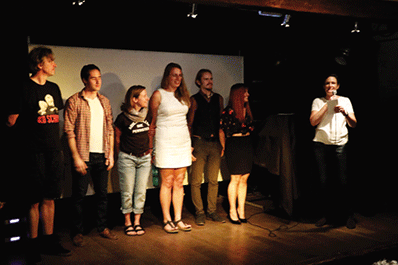
THE FUTURE OF RESEARCH IN EUROPE
The future of research in Europe was one of the hottest topics explored at the ESOF 2018. The discussion was launched on Tuesday 10 July by a special panel on Horizon Europe, the upcoming European Research and Innovation Programme for the period from 2021 to 2027. The panel included Carlos Moedas (European Commissioner for Research, Science and Innovation), Maria Leptin (European Molecular Biology Organisation) and MCAA’s Angela Bellia (Institute for Archaeological and Monumental Heritage at the Italian National Research Council). Addressing Commissioner Moedas, Angela questioned how Horizon Europe can make the best use of human resources. She stressed that Horizon Europe’s success hinges on how well it manages to overcome the geopolitical differences around the continent.
MCAA also organised sessions focussed on future perspectives for researchers, specifically related to open science, researcher organisations and career development.
For instance, the Open Science session on Thursday 12 July focussed on implementation strategies. From the discussion, it became apparent that most researchers and institutions believe science should be more open and transparent. As such, the session explored implementation strategies, noting the current tension between established infrastructures and emerging structures for open data, open access and open science in general. Participants shared experiences and examples of institutions already considering open science in their hiring and promotion decisions. The examples confirmed that open science can be implemented on an institutional level.
In a panel led by MCAA member Nina Díaz Ferández, the future of social sciences and humanities (SSH) research was discussed. The focus was on transferable skills development to increase employability of SSH researchers. With a unified SSH representation, the field is better equipped to advise and influence research policy.
CAREER DEVELOPMENT
Researcher career development was another topic explored at ESOF 2018. MCAA chair, Dr Matthew DiFranco, presented the findings of the 2017 MCAA survey, which has not yet been published. The survey asked 5,479 former MSCA funding recipients in 62 countries about their current career, mobility profile and barriers faced in their career.
Sara Ricardo, a board member of MCAA, organised and moderated a panel discussion on the ‘lost generation’ of European researchers. Speakers called for more awareness of the career development challenges facing young researchers. There was widespread agreement that early-stage researchers do not benefit from short-term contracts, especially in combination with teaching and other non-research responsibilities. As such, more flexibility at all levels and training for PIs is considered key.
Support for researchers – at all stages of their careers – through research associations was the topic of another session led by MCAA member Maria-Antonietta Buccheri. Establishing networks between different research organisations can minimise competition for funding and make a unified impression towards policymakers, while providing support and networking opportunities at all levels.
During a session about family- friendly research and work-life conflicts (led by MCCA member Giovanna Avellis) one member of the audience noted these are issues concerning both women and men. A gender-mixed panel explored work-life balance issues and how these vary by country, employment sector and university. As regards university, participants noted that some universities have already undertaken exemplary initiatives offering parental leave and support systems for young families. For many MCAA members, who face extra difficulties due to their highly mobile profile, it was reassuring to note the situation is gradually improving.
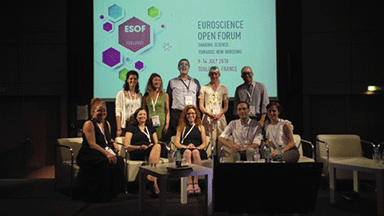
The panel for How best to integrate academics and student refugees into higher education: Andreina Laera (MCAA), Fernanda Bajanca (MCAA), Matthew DiFranco (MCAA), Rebecca Murray (Helena Kennedy foundation), Miguel Antonio Lim (MCAA), Jaclyn Rosebrook-Collignon (CoMUE Migrant Work Group), Eleni Adrianopulu (Welcome Centre, EURAXESS), Veronica Cesco (European Commission), Amir Al Oustah (Université Paul Sabatier, Toulouse) and Maria Blöcher (Kiron Open Higher Education)
There is also another group of researchers who require extra support and assistance to integrate. These are refugees – both academics and students. Their integration was the topic of a session moderated by MCAA member Andreina Laera on Wednesday 11 July. According to the findings of a survey of over 2,000 respondents, there is a lack of knowledge and resources, as well as a lack of awareness about initiatives that already exist. However, time is of the essence as lives and careers can be lost through years spent in migrant camps and out of education and work. There is also evidence that rapid integration yields economic benefits for the host country. In conclusion, the panel called on institutions to hire more refugees.
There was so much interest on this topic that the MCAA organised a special session on the last day of ESOF 2018 to screen the documentary “Science in Exile”. The film’s director Nicole Leguhissa led a lively discussion following the screening.
TRANSPORT AND COMMUNICATION
Organised by MCAA member Pavlo Bazilinskyy, this session focussed on the environmental impact of transportation. The panel was asked whether technology is the solution for lower contamination or if
people’s behaviours play a bigger role? The views were mixed. Some speakers argued technology should and will play the most important role in the change, while others stressed the need for social change – to convince people to opt for more eco-friendly modes of transportation and to change the social attitudes about the need to own a car. The panel agreed on the importance of accessibility of sustainable travel to make any real change.
A short session by Dr Nehama Lewis, also an MCAA member, raised issues related to the use of social media to communicate research. She explained there are two main questions to ask about the target audience: Are they able to understand the topic and are they motivated to learn about these topics? Most often, the answer to both questions is “no”. In these cases, it is best to focus on a message that is eye-catching and concise. Dr Lewis also urged researchers to ensure they have first established themselves as a credible source.
MENTAL HEALTH
Last, but definitely not least, MCAA member Brian Cahill chaired a popular session about researcher mental health. The panel highlighted the factors that make research such a high-risk profession for mental health. A long list of underlying factors contributing to this include long working-hours, the highly competitive nature of research, lack of support structures, a tendency for harassment and bullying, and the lack of clarity in academic roles. The audience worked in groups to discuss solutions. The session ended with a clear message to become more aware of this problem and learn to talk about it, whether PhD students, researchers, supervisors, institutions or policymakers.
CONCLUSION
ESOF 2018 provided a comprehensive overview of the most current topics concerning researchers from all fields of study. The meeting looked to the future of scientific research and innovation in Europe. Some of the key messages of this discussion-intense week were the need for Principal investigators, who are well-trained in transferable skills, to support their team members during early-stage career development, and to help them maintain a healthy work life balance. Related to this, participants agreed on the need to raise awareness about how work-related pressures can have a negative impact on researcher’s mental health. Specifically, speakers agreed that all related taboos should be eliminated, and researchers should be encouraged to talk about these issues.
Two important factors for European scientists were also highlighted. These are Open Science and science communication for broader audiences. Despite the important role these two factors already play, more needs to be done, particularly at the level of recognising those who apply them within the scientific community. The aim is to enhance implementation levels.

VALERIE BENTIVEGNA
IVANA KRAISELBURD
MCAA WORKSHOP: DRIVING SOLUTIONS FOR SCIENCE IN BUSINESS
Murat Gunes and Marco Masia organised the MCAA Workshop: Driving Solutions for Science in Business, which took place in Paris, 5-6 July. Here’s why the event was so successful.
Organised by Bridging Science and the Business Working Group of Marie Curie Alumni Association, in partnership with the Université Paris-Saclay, the workshop proved to be highly valuable for researchers thinking about launching their own start-up.
MCAA opened the workshop by explaining how challenging industry- academic collaborations can be. The issue was further addressed by high-calibre speakers who shared their own experience and offered their best advice
Guillaume Garret, the International Development Director at Université Paris-Saclay, highlighted the work of the European Department in promoting Marie Curie projects.
In turn, Professor Martin Rottman drew on his own experience in creating a business. He presented “Nasoflore” his technology transfer project and how he drove this nasal microflora project from inception to commercialisation. He highlighted the support received from the Paris- Saclay SATT.
The morning session ended with a round table facilitated by Philippe Masson, President of the Paris-Saclay Ile-de-France association. Academics and industry leaders (CEA, Fablabs, Université Paris- Sud, Nokia, TE-OX, Thalès) discussed issues inherent to the relationship between business and research.
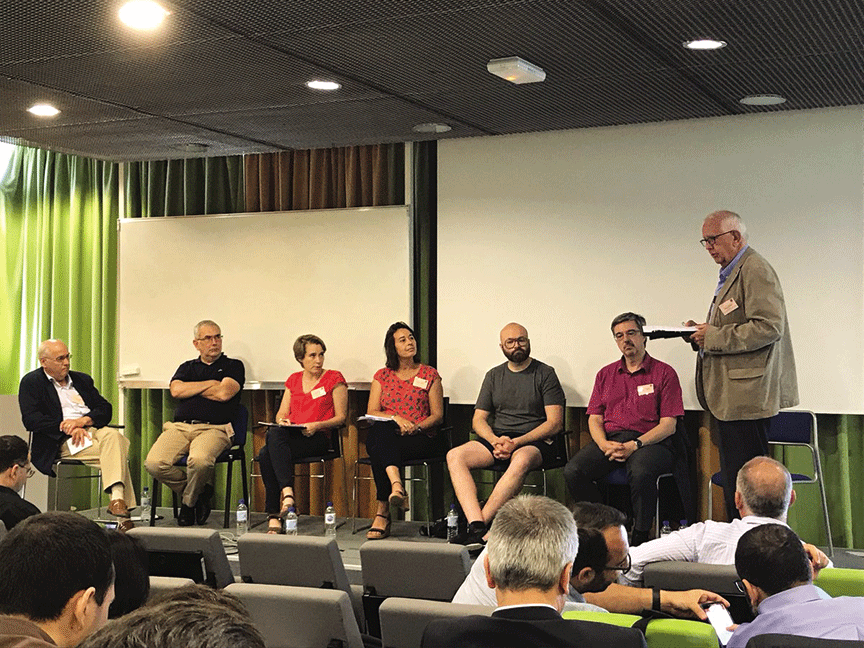
The afternoon’s parallel sessions allowed participants to receive practical and comprehensive information on the various business creation pathways. These sessions focussed on marketing, investment and funding, as well as start-up experiences, entrepreneurship, ethics and communications. MCAA members Marco Masia and Mariya S.E-Gardair took the floor to speak about innovation and android programming, respectively.
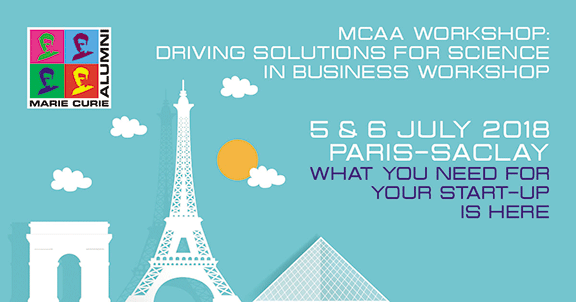
In the evening, the audience learned about business creation opportunities in Turkey and Israel.
The following morning, Tania Di Gioia, Université Paris-Saclay’s Innovation Director, outlined the University’s innovation potential. Intellectual property issues, presented jointly by Karim Tadrist, Director of Legal Affairs at Université Paris-Saclay, and Inna Dimova, a consultant, were also highly valued by attendees.
About 80 people participated in the event and showed a great deal of interest in the programme. Almost half of the participants were members of MCAA and came from different European countries. As a result, exchanges were fruitful and particularly multicultural and several partnership projects are now being discussed. For instance, a young researcher intends to apply for a Marie Curie grant to set up a research project at the Université Paris-Saclay.
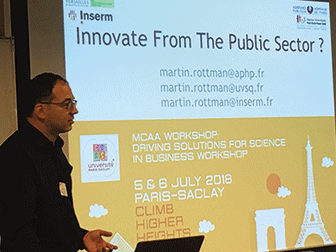
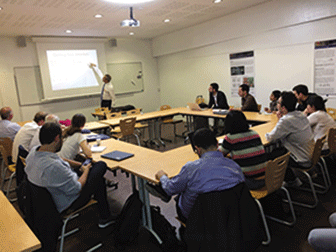
In fact, this partnership with the Université Paris-Saclay has proven to be so successful that the MCAA European Department will extend it. The aim is to promote meetings among European researchers and the development of new transnational projects.
The 5-6 July workshop was hosted by the Université Paris-Saclay and sponsored by MCAA, Université Paris-Saclay, Université Paris Sud, Turkish Invest, SRM and Anovra. Associations such as Science Accueil and IledeScience Paris-Saclay also backed the event.
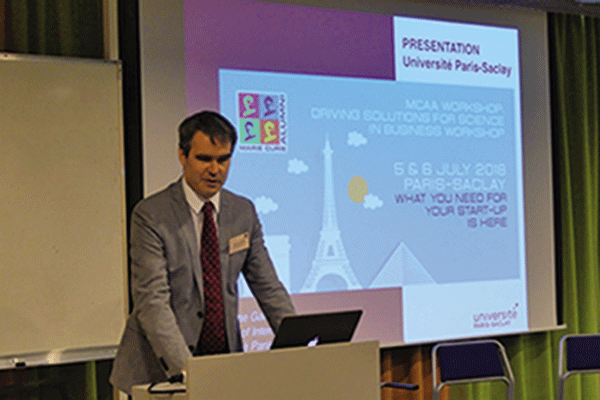
Guillaume Garreta, International Development Director at Université Paris-Saclay
MURAT GUNES
CAREER DEVELOPMENT SEMINAR
TITLE: Opportunities beyond Individual Fellowships
ORGANISER: MSCA National Contact Point Team Austria (Austrian Research Promotion Agency): Therese Lindahl, Lil Reif and Yasmin Dolak-Struß
MARIE CURIE ALUMNI ASSOCIATION: Mostafa Moonir Shawrav
LOCATION: Vienna

The Marie Curie Alumni Association (MCAA) organised a career development session for MSCA Individual Fellows in Vienna on June 26. Hosted in collaboration with Austria’s MSCA National Contact Point Team, more than 20 people attended the event.
Participants included delegates from the Research Executive Agency, Frank Max (Deputy Head of Unit), Nikolay Kutsev (Project Adviser) and Alberto Huidobro (Project Adviser).
Addressing potential MCAA members at the event, Mostafa explained how membership can help them advance their career. He presented an overview of the services and support offered to members, including micro grant opportunities, training and mentoring. A key part of the presentation focussed on providing academic and entrepreneurship funding opportunities in Austria, as well as a glimpse of the 2017 MCAA survey.
Participants expressed interest in the survey and shared their ideas about how to improve the academic environment. At the end of the talk, participants engaged in an informal and lively discussion. They shared their experiences with delegates. Following the event, several participants joined the MCAA, as well as the Austrian Chapter.
Organisers and delegates appreciated the efforts of MCAA on various issues including career development training and science policy. They believe the MCAA can play a pivotal role organising such workshops and informing fellows about their future opportunities.
THE DARK SIDE OF RESEARCH
MCAA’S COMEDY ‘EXPERIMENT’ ON HOW TO ENGAGE SOCIETY AT THE EDINBURGH FESTIVAL FRINGE
Every August for three weeks, Scotland’s capital city of Edinburgh welcomes an explosion of creative energy from around the globe. MCAA Vice-Chair Valentina Ferro attended the Edinburgh Festival Fringe and reports on the amazing performance of MCAA members.
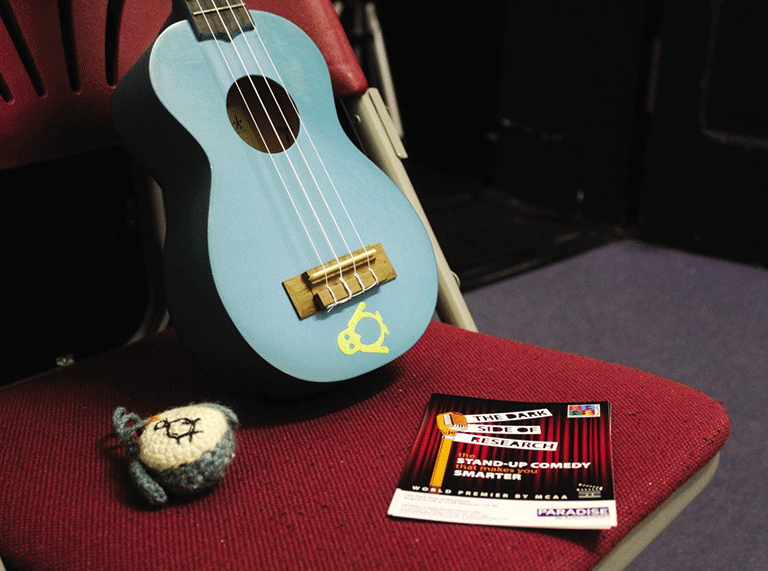
In the Greek language, “logos” means “word”. But in the limited ancient Greek dictionary, it is also the word for “reason” or “logic”. I remember vividly when my high school teacher pointed this out: “There would be no logical thinking if we could not express a thought in words”. More than 10 years have passed, and her phrase still resonates with me. I moved away from the study of lost languages and I am now on the path of the scientist, but those words remain true: what would be the point of research if we were not able to communicate it to others?
Science communication is a hot topic nowadays. Institutions are training staff to communicate with the public, especially in light of Open Science. Contemporaneously, researchers face the onerous task of engaging with the community in the battle against fake news and clickbait.
So, I ask, what are our “weapons” in this battle? ...Perhaps, a joke?
Too often we researchers are repEvery August for three weeks, Scotland’s capital city of Edinburgh welcomes an explosion of creative energy from around the globe. MCAA Vice-Chair Valentina Ferro attended the Edinburgh Festival Fringe and reports on the amazing performance of MCAA members. © Davide Ferro 27 NEWSLETTER resented as snobbish geniuses, disconnected from the world and possibly suffering from social anxiety. When we speak, we talk gibberish and become tangled in the details. While this representation provides a perfect recipe for a successful comic book series, it does not represent us. And yet comedy is a powerful medium to connect people from different backgrounds. You don’t need to be a genius to laugh with Sheldon Cooper. You don’t need to know everything about computers to enjoy the IT crowd. You don’t need to be a geek to have fun with Scrubs. The characters of these series and the people watching them are both human, with the same everyday problems, the same anxieties, the same small glorious moments. This is the beauty of comedy: it brings people closer.
Can we use comedy to talk about science and research? There are countless examples of this. We, as MCAA researchers, tried to answer this question with our own personal experiment.
This is why we participated at the Edinburgh Fringe Festival this year. It is the world’s largest arts festival counting thousands of performances and shows in more than 300 different venues around the city. It is international, it is colourful, and it is fun.
And so, our show was titled “The Dark Side of Research”. During the past year, we selected four talented researchers to set aside fear, step on a stage and talk to strangers about their research in a fun and engaging way. The result was better than we anticipated! Let me give you a glimpse.
The stage is dark, more than 30 people quietly enter the room. They do not know what to expect. An inevitable cough breaks the silence. Quirky science music plays in the background. The lights switch on and Matthew jumps onto the stage. White coat, a crazy scientist hairstyle and a big smile. The public is immediately drawn into the adventure. Matthew is a cancer researcher, but he is also a fantastic creator of content, with ideas for comedy science TV shows and interesting podcasts. He will accompany the audience through the show with funny jokes about real research studies.
Between the laughs from the audience, he introduces the first performer, Valerie. She enters the stage, but she is not alone. Her small friend, Bruno the Ukulele, is with her on stage. She sings about what it means to be a nerd and why it is so cool. But she also takes everyone on the journey of her PhD with all its ups and downs: the enthusiasm of starting, the failures along the way and the final satisfaction of the arrival, knowing that she is helping to push knowledge forward. The few academics in the audience can remember the feeling, but also the others can relate. At the end of the day, isn’t that the description of everything in life?
And then we welcome Yana with her ode to the marvels of science, from cloning to head-body transplants. However, she reminds us that even the smallest achievements from the smallest creatures can bring humanity forward. She specialises in the disposal of waste through micro-bacteria that transform it in alcohol. Being in Scotland, you can only imagine the cheers she receives for that! Last performer and more music on the way with Coren, an environmental scientist who talks with the soil she treats. And the soil, apparently, responds with a moving blues song. The audience is almost enchanted by her voice and the funny relief moments in the story of a soil that is contaminated but can still teach us so much. When Matthew calls back everyone on stage, those 45 minutes that looked so frightening at the first are almost over. The public joins our wonderful science communicators in the chorus of the final song. The lights switch off. The people in the audience are still smiling and chatting as they leave the room. We repeated the show for five days for a total 165 attendees. On the day of our last show, there were people queueing outside.
I won’t lie to you, getting up on a stage is terrifying. Talking without PowerPoint to support your train of thought is paralysing. Hearing your own voice through the microphone is unsettling. Is it worth it? Sure, some people have learned about cancer research and microbiology and environmental science. But this is only one aspect of the story.
More importantly, we have done a small part in connecting with society. How can we expect to fight fake news if people think we are detached from reality? How do we develop communicative skills if we are scared of explaining our research to the general public? How do we transfer knowledge if we do not know how to reach people?
Every single day we ran the show, I was amazed that only few people in the audience were academics or scientists. The majority were people who had seen our flier and thought it could be fun or interesting. After all, society craves for knowledge. We should be ready to pass it on in the most creative way.
We need seminars in auditoriums and kids activities at open days. We need the peer-reviewed papers and science blogs. We need panel discussions at conferences and quirky comedy shows at arts festivals. We need to diversify and adapt to an everchanging society.
One of our goals as MCAA is to advocate for an interconnected, multicultural future where the voice of researchers is heard and valued.
I am also immensely proud that, with our participation at the Edinburgh Fringe, we stepped out of our comfort zone to achieve this. I believe that with our association, we can challenge ourselves to think outside the proverbial box and to cultivate the variegate set of talents presented in our network.
I wish to thank again Matthew, Valerie, Yana and Coreen. Thanks to their courage and enthusiasm, our little experiment was more than successful. But just like anything in science, we need reproducibility. So, stay tuned to learn about more events and opportunities coming up in the next months!
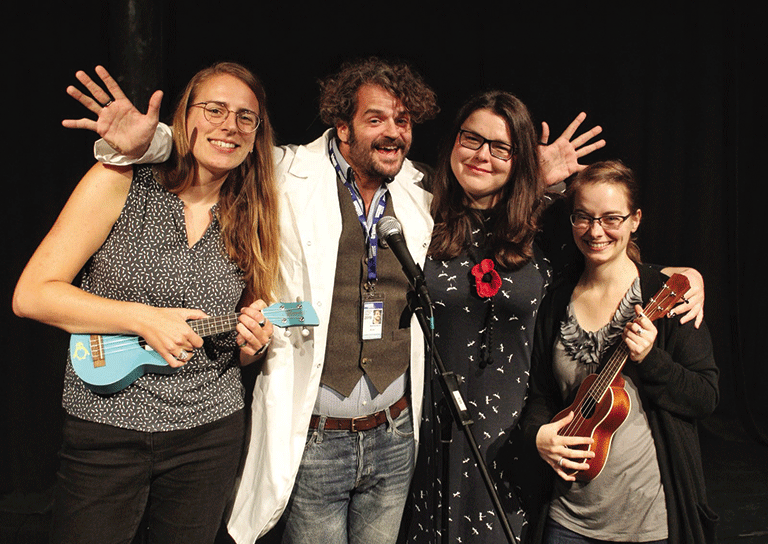
VALENTINA FERRO